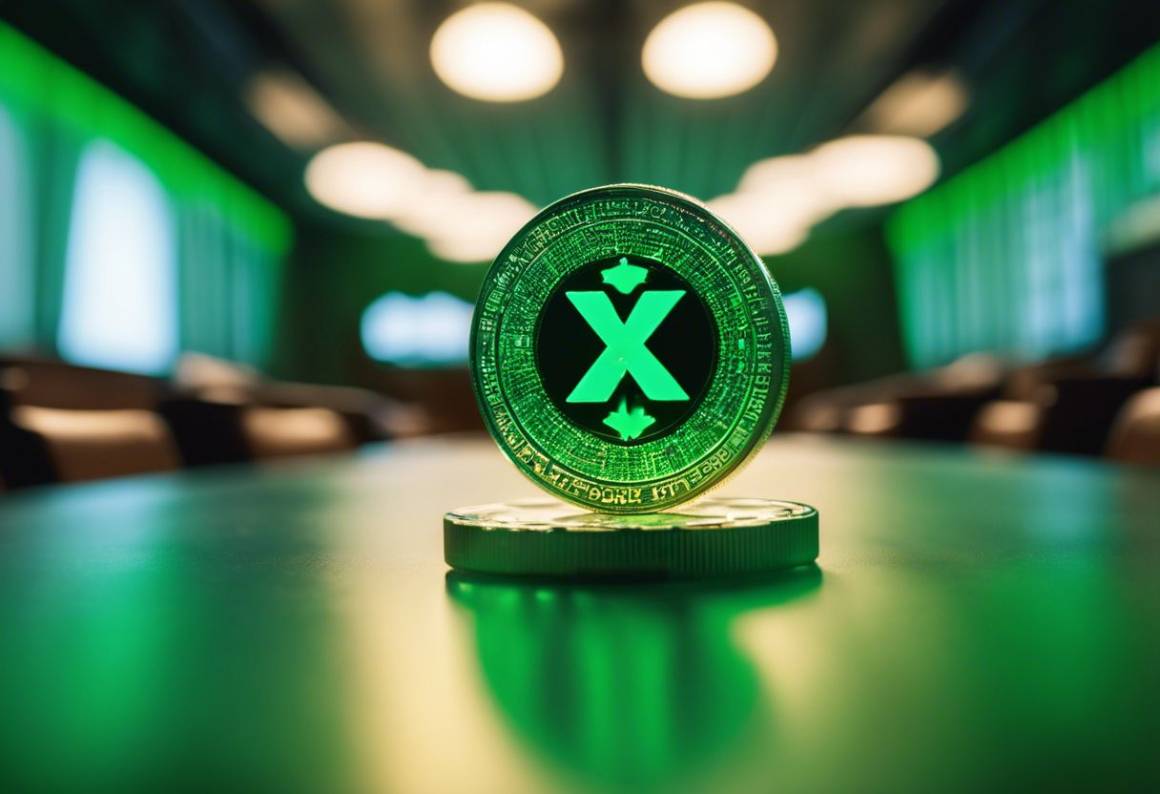SEC e XRP: l’importanza della recente sentenza e le implicazioni future

Risultato della corte su XRP
Il legale di Ripple, Stuart Alderoty, ha confermato che la Commissione per i Valori Mobiliari degli Stati Uniti (SEC) non ha presentato ricorso contro la sentenza del tribunale che ha stabilito che l’XRP non è un titolo. Questo sviluppo rappresenta una pietra miliare significativa nel contesto delle operazioni di Ripple, poiché la decisione del tribunale ora si impone come diritto vigente.
Alderoty ha commentato questa situazione in risposta alla notizia che la SEC ha presentato un’istanza di ricorso di tipo Form C. Il legale James K. Filan ha confermato che la SEC ha effettivamente depositato documenti presso la Corte d’Appello. Tuttavia, la questione centrale resta: l’effettiva valutazione del tribunale è stata quella di escludere XRP dalla classificazione di titolo, e questa decisione rimane intatta.
Form C, che sta per “Dichiarazione Pre-Argomento di Ricorso Civile”, è un documento in cui la SEC dichiarava la sua intenzione di contestare specifiche decisioni legali nel corso di un processo. Nel caso di Ripple, l’agenzia regolatrice ha chiesto al tribunale di rivedere l’applicazione della legge in merito a un precedente giudizio riassuntivo. Ciò implica che il giudice esaminerà gli aspetti legali della causa e non solo la decisione finale.
Tra le questioni poste vi è la richiesta della SEC di riconsiderare la sentenza relativa alla vendita di token XRP sui mercati e anche le vendite personali di XRP da parte del CEO di Ripple, Brad Garlinghouse, e del cofondatore Chris Larsen. In risposta, Ripple prevede di presentare un controricorso per contestare la decisione sulle vendite istituzionali, il che promette un lungo processo legale capace di influenzare la classificazione e la regolamentazione degli asset digitali nel futuro.
Con questo contesto, ci si aspetta il deposito della Form C da parte di Ripple nei prossimi giorni, mentre gli osservatori del mercato continuano a monitorare da vicino gli sviluppi di questa controversia legale che ha il potenziale di ridefinire la landscape delle criptovalute in America.
Appello della SEC: cosa significa?
La decisione della SEC di non presentare appello contro la sentenza che ha escluso l’XRP dalla classificazione di titolo ha suscitato molteplici interrogativi, specialmente in merito al significato di questa scelta nel contesto giuridico più ampio. La presentazione della Form C, che segna l’intenzione dell’agenzia di contestare determinate decisioni legali, non implica che la SEC rinunci completamente alla sua battaglia contro Ripple. In effetti, l’agenzia sta cercando di rivedere alcuni aspetti specifici della sentenza, in particolare quelli riguardanti le vendite di XRP sui mercati e le transazioni personali dei membri chiave della società.
Nel suo ricorso, la SEC ha chiesto al tribunale di analizzare l’applicazione della legge alle vendite condotte da Ripple. Questo processo di revisione giuridica si concentrerà non solo sulle vendite pubbliche, ma anche sulle vendite private effettuate dai dirigenti di Ripple. La questione cruciale è se queste vendite debbano essere considerate transazioni di titoli, un tema che ha dominato il dibattito legale e regolamentare riguardante le criptovalute negli ultimi anni.
Stuart Alderoty ha esortato in modo chiaro a seguire l’andamento della causa, evidenziando che le ripercussioni di queste dispute legali possono avere un impatto significativo non solo su Ripple, ma sull’intero settore delle criptovalute. Con la SEC che avrà a disposizione 90 giorni per presentare la sua memoria iniziale, ci si aspetta che l’agenzia utilizzi questo tempo per elaborare un esposto che delinei in dettaglio le sue argomentazioni legali.
Questo scenario introduce una fase di incertezze legali per Ripple; mentre la corte ha stabilito che XRP non è un titolo, la SEC potrebbe cercare di ribaltare quella decisione in base a particolari transazioni. Il risultato finale di questo processo avrà delle conseguenze più ampie, potenzialmente ridefinendo il modo in cui i beni digitali vengono regolati e classificati non solo negli Stati Uniti, ma a livello globale.
In questi frangenti, la strategia di Ripple sarà fondamentale. La società prevede di presentare un controricorso per ribattere alle obiezioni della SEC, indicando che la battaglia legale è tutt’altro che conclusa. Con la complessità e la lunghezza del processo giuridico che si profila all’orizzonte, è evidente che gli sviluppi futuri richiederanno un’attenta osservazione da parte di investitori e attori del mercato delle criptovalute.
Previsione del processo legale prolungato
Il caso di Ripple ci conduce verso un contesto di contestazioni legali che potrebbe estendersi fino a luglio 2025, secondo quanto affermato da Stuart Alderoty. La narrazione si complica con l’intenzione della SEC di presentare un appello su specifiche decisioni del tribunale, costringendo Ripple a preparare il proprio controricorso. Questa fase del processo legale non è solo un aspetto interno per Ripple, ma ha il potenziale di ridefinire l’intero panorama normativo per le criptovalute negli Stati Uniti e, potenzialmente, oltre.
L’agenzia avrà a disposizione 90 giorni per compilare un documento che esponga dettagliatamente le sue argomentazioni legali. Alderoty prevede che la SEC utilizzerà questo tempo per redigere un piano strategico ben articolato, con l’obiettivo di sostenere la sua posizione. Tuttavia, la risposta di Ripple non si farà attendere: la società avrà il diritto di presentare una contro-memoria e un proprio documento, avviando così una sorta di ping pong legale che si затмò rappresentare una sfida non indifferente per entrambi i lati coinvolti.
Il processo di revisione legale pianificato non si limiterà a riguardare la questione del titolo XRP, ma si estenderà alle vendite private effettuate da Garlinghouse e Larsen, gettando una luce su come queste possano essere interpretate sotto il profilo normativo. La distinzione tra transazioni di titoli e altre forme di vendita coinvolge questioni fondamentali riguardanti la protezione degli investitori e la regolamentazione degli asset digitali. Questa controversia mette in evidenza la necessità di una2547261 struttura normativa che possa tenere conto della rapidità e del dinamismo del mercato delle criptovalute.
La lunghezza di questo processo legale rappresenta non solo un periodo di attesa per Ripple, ma anche una fase critica per l’intero settore delle criptovalute. Con la SEC che mira a rivedere questioni legali fondamentali, ci si aspetta che altri casi legali simili possano emergere, influenzando ulteriormente la regolamentazione degli asset digitali in generale. Entro la scadenza prevista per la conclusione di questo processo, potrebbe esserci un cambiamento sostanziale nella classificazione e nella gestione delle criptovalute rispetto alla legge vigente.
Le implicazioni per Ripple potrebbero essere significative: se la SEC riuscisse a ottenere un cambio di giudizio, ciò potrebbe avere ripercussioni su milioni di investitori e influenzare i futuri sviluppi nella roadmap della società, inclusa la possibilità di una IPO. Pertanto, l’attenzione verso le nuove evoluzioni legali diventa cruciale sia per gli investitori che per coloro che seguono l’evoluzione del settore cripto.
Impatto sul mercato e sul futuro di Ripple
Nonostante le tensioni legali in corso, la reazione del mercato alle recenti notizie sulla causa tra la SEC e Ripple è stata relativamente contenuta. Dopo la conferma che l’agenzia non ha presentato appello contro la sentenza giuridica a favore di Ripple, il prezzo di XRP ha mostrato una moderata crescita, attestandosi a un aumento dell’1.74% nell’arco della settimana, con un valore di scambio di [gpt_article engine=”openai-gpt-4o-mini” topic=”SEC Didn’t Appeal Key XRP Ruling, But That’s Not the End of the Story” sections=”5″ structure=”Prima di
generare i nomi delle sezioni, analizza l’articolo seguente e utilizzalo come riferimento per la
struttura della sezione del nuovo articolo per garantire che tutte le informazioni essenziali siano
incluse.
L’ARTICOLO PER LA TUA ISPIRAZIONE:
Ripple’s chief legal officer, Stuart Alderoty, confirmed that the U.S. Securities and Exchange Commission has not appealed the court’s ruling that XRP is not a security.
The lawyer’s comment was in response to the news that the SEC filed a Form C civil appeal. Ripple attorney James K. Filan confirmed that the SEC did indeed file documents with the Court of Appeals.
No surprises here — once again it’s been made clear. The Court’s ruling that “XRP is not a security” is NOT being appealed. That decision stands as the law of the land.Stay tuned for Ripple’s Form C to be filed next week. https://t.co/m9molUGSBv— Stuart Alderoty (@s_alderoty) October 18, 2024
Form C, (“Civil Appeal Pre-Argument Statement”) is a document in which the SEC states its intention to appeal certain legal decisions made in a case. In Ripple case, the SEC asked the court to review the application of the law in a previous summary judgment. This means that the judge will analyze the legal aspects of the case, not just the final decision.
In the claim, the regulator asked to reconsider the court’s decision to sell Ripple (XRP) token on exchanges, as well as personal sales of the token by Ripple CEO Brad Garlinghouse and co-founder Chris Larsen.
Ripple is set to file its own cross-appeal to challenge the ruling on institutional sales, and both sides are bracing for a lengthy process that could change how digital assets are classified and regulated in the future. Alderoty urged to watch Ripple’s Form C filing this week.
How did XRP react?
Amid the latest news on the case, the price of XRP remains relatively stable. The asset’s price has increased by 1.74% over the past week. At the time of writing, XRP is trading at $0.5468.
Source: crypto.news
The token was a detriment to the overall crypto market growth, which increased by 0.59%, reaching a capitalization of $2.36 trillion in 24 hours.
SEC and Ripple disputes will continue until next year
According to Alderoty, the case could drag on until July 2025. In a conversation with Fox Business correspondent Eleanor Terrett, he noted that the crypto project will also file a Form C application, in which it will outline arguments for a counter-appeal.
The SEC will have 90 days to file an opening brief. Alderoty expects the regulator to use this time to prepare the most comprehensive presentation of its arguments.
“Both parties will then agree on a briefing schedule and the SEC then has up to 90 days to file its first brief. Alderoty says he expects them to take the full 90 days. That opening brief will be a full recitation of all the legal arguments that the SEC will be making. Ripple will file a response and then its own brief. The full briefing process, according to Alderoty, will go through July 2025.”
Eleanor Terrett, Fox Business correspondent
Ripple will not conduct IPO because of SEC
Garlinghouse previously commented on the company’s possibility of entering the stock market, drawing attention to the position of the SEC and the financial stability of Ripple. When asked about a potential IPO after the expected clarification of regulatory standards, Ripple CEO said that this is not the main goal for the company.
“An IPO has not been a high priority for us and part of that is because the SEC is not our friend. I’m not really popular there. They don’t have pictures of me in the halls of the SEC unless they have dart boards on them.”
Brad Garlinghouse, Ripple CEO
Garlinghouse also shared his hopes for the future of the crypto market until 2025. Despite the current difficulties in the industry, he expressed optimism, noting the changes in the positions of the U.S. government and increased interest from major players such as BlackRock. This indicates growing interest from institutional investors in blockchain technologies and their capabilities.
He added that an improvement in the regulatory environment is important for entering the stock exchange, but Ripple has a strong financial foundation, which allows the company to continue its projects even without an IPO.
Back to the beginning: How the SEC and Ripple saga began
In December 2020, the SEC filed a lawsuit against Ripple Labs Inc. and its co-founders, Christian Larson and Jed McCaleb. The lawsuit was based on the accusation that they conducted unwarranted sales of an unspecified number of XRP tokens, which the SEC considered to be unregistered securities.
The SEC alleged that Ripple issued billions of XRP tokens and sold them for more than $1.3 billion without the appropriate registration collateral. According to the SEC, the XRP token should have been registered as a security. The SEC also emphasized that XRP creates an expectation of profit for investors, which meets the criteria for classification as a security.
Ripple, in turn, argued that XRP should not be considered a security but a digital currency similar to Bitcoin (BTC) and Ethereum (ETH), which the SEC does not classify as securities. Thus, the company insisted that its actions comply with applicable law.
In July 2023, the court recognized that selling XRP to private investors cannot be equated to securities transactions. Still, the issue of large players purchasing tokens under a preliminary agreement remains open.” directives=”Identificati in un giornalista professionista e riscrivi completamente con competenza professionale e utilizzando uno stile autorevole ed essenziale un nuovo ed entusiasmante articolo in formato post
di blog attenendoti strettamente al testo fornito e senza inventare nulla, verificando che non ci siano paragrafi o frasi copiate uguali al testo fornito, tutto il testo deve essere originale e diverso dal testo fornito come ispirazione, se è presente mantieni il testo in grassetto, corsivo, sottolineato, mantieni i link esterni se presenti, formatta il testo per incorporarlo in un post WordPress utilizzando solo
,
,
,
- ,
- ,
,
, , , , and tags.
Escludi eventuali altri tag HTML. Le sezioni devono avere almeno 250 parole e non devono superare le 400 parole. Il titolo di ogni sezione se possibile deve includere il soggetto principale del post. Utilizza l’articolo di riferimento qui sotto per trovare ispirazione.
L’ARTICOLO PER LA TUA ISPIRAZIONE:
Ripple’s chief legal officer, Stuart Alderoty, confirmed that the U.S. Securities and Exchange Commission has not appealed the court’s ruling that XRP is not a security.
The lawyer’s comment was in response to the news that the SEC filed a Form C civil appeal. Ripple attorney James K. Filan confirmed that the SEC did indeed file documents with the Court of Appeals.No surprises here — once again it’s been made clear. The Court’s ruling that “XRP is not a security” is NOT being appealed. That decision stands as the law of the land.Stay tuned for Ripple’s Form C to be filed next week. https://t.co/m9molUGSBv— Stuart Alderoty (@s_alderoty) October 18, 2024
Form C, (“Civil Appeal Pre-Argument Statement”) is a document in which the SEC states its intention to appeal certain legal decisions made in a case. In Ripple case, the SEC asked the court to review the application of the law in a previous summary judgment. This means that the judge will analyze the legal aspects of the case, not just the final decision.
In the claim, the regulator asked to reconsider the court’s decision to sell Ripple (XRP) token on exchanges, as well as personal sales of the token by Ripple CEO Brad Garlinghouse and co-founder Chris Larsen.
Ripple is set to file its own cross-appeal to challenge the ruling on institutional sales, and both sides are bracing for a lengthy process that could change how digital assets are classified and regulated in the future. Alderoty urged to watch Ripple’s Form C filing this week.How did XRP react?
Amid the latest news on the case, the price of XRP remains relatively stable. The asset’s price has increased by 1.74% over the past week. At the time of writing, XRP is trading at $0.5468.Source: crypto.news
The token was a detriment to the overall crypto market growth, which increased by 0.59%, reaching a capitalization of $2.36 trillion in 24 hours.
SEC and Ripple disputes will continue until next year
According to Alderoty, the case could drag on until July 2025. In a conversation with Fox Business correspondent Eleanor Terrett, he noted that the crypto project will also file a Form C application, in which it will outline arguments for a counter-appeal.
The SEC will have 90 days to file an opening brief. Alderoty expects the regulator to use this time to prepare the most comprehensive presentation of its arguments.“Both parties will then agree on a briefing schedule and the SEC then has up to 90 days to file its first brief. Alderoty says he expects them to take the full 90 days. That opening brief will be a full recitation of all the legal arguments that the SEC will be making. Ripple will file a response and then its own brief. The full briefing process, according to Alderoty, will go through July 2025.”
Eleanor Terrett, Fox Business correspondent
Ripple will not conduct IPO because of SEC
Garlinghouse previously commented on the company’s possibility of entering the stock market, drawing attention to the position of the SEC and the financial stability of Ripple. When asked about a potential IPO after the expected clarification of regulatory standards, Ripple CEO said that this is not the main goal for the company.“An IPO has not been a high priority for us and part of that is because the SEC is not our friend. I’m not really popular there. They don’t have pictures of me in the halls of the SEC unless they have dart boards on them.”
Brad Garlinghouse, Ripple CEO
Garlinghouse also shared his hopes for the future of the crypto market until 2025. Despite the current difficulties in the industry, he expressed optimism, noting the changes in the positions of the U.S. government and increased interest from major players such as BlackRock. This indicates growing interest from institutional investors in blockchain technologies and their capabilities.
He added that an improvement in the regulatory environment is important for entering the stock exchange, but Ripple has a strong financial foundation, which allows the company to continue its projects even without an IPO.
Back to the beginning: How the SEC and Ripple saga began
In December 2020, the SEC filed a lawsuit against Ripple Labs Inc. and its co-founders, Christian Larson and Jed McCaleb. The lawsuit was based on the accusation that they conducted unwarranted sales of an unspecified number of XRP tokens, which the SEC considered to be unregistered securities.
The SEC alleged that Ripple issued billions of XRP tokens and sold them for more than $1.3 billion without the appropriate registration collateral. According to the SEC, the XRP token should have been registered as a security. The SEC also emphasized that XRP creates an expectation of profit for investors, which meets the criteria for classification as a security.
Ripple, in turn, argued that XRP should not be considered a security but a digital currency similar to Bitcoin (BTC) and Ethereum (ETH), which the SEC does not classify as securities. Thus, the company insisted that its actions comply with applicable law.
In July 2023, the court recognized that selling XRP to private investors cannot be equated to securities transactions. Still, the issue of large players purchasing tokens under a preliminary agreement remains open.” language=”Italiano” heading=”h2″].5468 al momento della scrittura. Questo incremento avviene in un contesto più ampio, nel quale il mercato delle criptovalute ha visto una flessione più contenuta, con una crescita complessiva del 0.59%, raggiungendo una capitalizzazione di mercato di .36 trilioni.Il legale di Ripple, Stuart Alderoty, ha avvertito che il caso potrebbe prolungarsi fino a luglio 2025, suggerendo che la battaglia legale potrebbe continuare ad avere ripercussioni significative sul settore delle criptovalute. Non solo Ripple affronta il rischio di ulteriori complicazioni giuridiche, ma anche la più ampia comunità cripto potrebbe subire conseguenze da queste disputate legali. I risultati di questa causa potrebbero stabilire un precedente cruciale nel modo in cui le criptovalute vengono regolate negli Stati Uniti, influenzando le politiche normative e la fiducia degli investitori.
Il CEO di Ripple, Brad Garlinghouse, ha enfatizzato l’importanza del contesto attuale nel quale si svolgono queste dispute, esprimendo cauta ottimismo sulla crescita del mercato cripto a lungo termine, nonostante le difficoltà attuali. Garlinghouse ha dichiarato che un miglioramento della situazione normativa sarà vitale per garantire la stabilità e la fiducia nel settore e possibilmente per favorire eventuali iniziative come un’IPO in futuro. Tuttavia, ha anche affermato che un’IPO non è attualmente una priorità per Ripple, vista la posizione della SEC nei confronti dell’azienda.
Le prossime fasi del processo giuridico saranno seguite con grande attenzione dagli investitori e dagli osservatori di mercato, poiché le decisioni giudiziarie avranno il potenziale di creare nuovi standard per la regolamentazione delle criptovalute. La questione dell’XRP, così come le vendite effettuate dai dirigenti di Ripple, continueranno a destare interesse e preoccupazioni tra i vari attori del mercato. Inoltre, l’aumento dell’interesse per le criptovalute proveniente da grandi investitori istituzionali come BlackRock indica che, nonostante le incertezze legali, la spinta verso l’adozione delle tecnologie blockchain continua a crescere, suggerendo una possibile ripresa a lungo termine per Ripple e per il mercato cripto nel suo complesso.
Storia della controversia tra SEC e Ripple
La controversia tra la SEC e Ripple ha avuto inizio nel dicembre 2020, quando l’agenzia di regolazione ha fatto causa a Ripple Labs Inc. e ai suoi cofondatori, Christian Larson e Jed McCaleb. L’accusa principale è stata quella di aver condotto vendite non autorizzate di token XRP, che la SEC ha definito come titoli non registrati. La SEC ha sostenuto che Ripple avesse emesso miliardi di token XRP, vendendoli per un valore superiore a 1,3 miliardi di dollari, e che tali transazioni dovessero essere sottoposte alle stesse normative di registrazione che si applicano ai titoli.
Il nocciolo della questione per la SEC era che XRP creava un’aspettativa di profitto tra gli investitori, un criterio chiave per la classificazione come titolo. Ripple, d’altra parte, ha contestato questa posizione, affermando che XRP dovesse essere considerato una forma di valuta digitale, paragonabile a Bitcoin (BTC) ed Ethereum (ETH), entrambi esclusi dalla definizione di titoli dalla SEC. Questa distinzione ha dato origine a un dibattito acceso su come le criptovalute debbano essere regolate, un tema che continua a generare incertezze nel settore.
Nel luglio 2023, il tribunale ha emesso una sentenza favorevole per Ripple, stabilendo che le vendite di XRP a clienti privati non possono essere considerate transazioni di titoli. Tuttavia, il giudice ha lasciato aperta la questione riguardante le vendite effettuate a investitori istituzionali, un aspetto che potrebbe influenzare significativamente la lunghezza e il risultato del processo legale.
Con la presentazione della Form C da parte della SEC, l’agenzia ha espresso l’intenzione di rivedere determinati aspetti della sentenza, in particolare concentrandosi sulle vendite realizzate da Ripple e sulle transazioni di XRP da parte dei dirigenti dell’azienda. Ciò indica un proseguimento della battaglia legale, con Ripple pronta a rispondere a queste nuove sfide. L’intera situazione non solo avrà ripercussioni dirette su Ripple, ma potenzialmente ridefinirà l’intero panorama normativo per le criptovalute negli Stati Uniti.
Questa saga legale ha messo in luce le complessità e le difficoltà con cui il settore delle criptovalute deve confrontarsi in termini di regolamentazione. Le decisioni del tribunale non influenzeranno solo le parti coinvolte, ma potrebbero anche stabilire un precedente cruciale che guiderà le future interazioni tra i regolatori e le entità nel mondo delle criptovalute. La storia della controversia tra la SEC e Ripple è quindi un capitolo significativo nella storia della regolamentazione delle criptovalute, e la sua evoluzione merita una costante attenzione.
DIRETTORE EDITORIALE
Michele Ficara Manganelli ✿
PUBBLICITA’ – COMUNICATI STAMPA – PROVE PRODOTTI
Per acquistare pubblicità CLICCA QUI
Per inviarci comunicati stampa e per proporci prodotti da testare prodotti CLICCA QUI
Inserisci la chiave di ricerca e premi invio.



